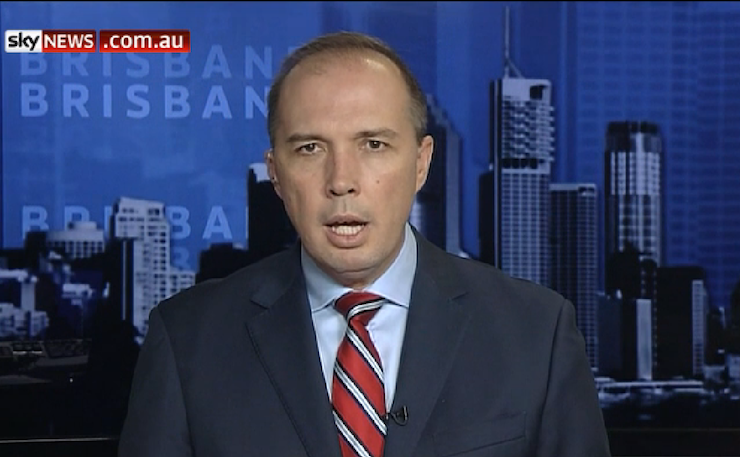The government asked for a review into how ‘traditional freedoms’ are being infringed. It got more than it bargained for. Max Chalmers reports.
When George Brandis announced he was asking the Australian Law Reform Commission (ALRC) to conduct an inquiry into laws encroaching “traditional rights, freedoms and privileges,” he made a bold promise.
“For too long we have seen freedoms of the individual diminish and become devalued. The Coalition Government will strive to protect and restore them,” the Attorney-General said.
“Freedoms are some of the most fundamental of all human rights. They underpin the principles of democracy and we cannot take them for granted.”
But with the Commission’s final report tabled this week, Brandis may be regretting such grandiose rhetoric during his government’s halcyon days of 2013. The report will make disconcerting reading for the Coalition’s freedom fighters, who appear to have pitched the wrong battles.
For all the fuss over anti-discrimination laws, at the completion of the two-year long project the ALRC has been unable to establish whether Section 18C of the Racial Discrimination Act has been responsible for “unjustifiable interferences with freedom of speech”.
On 18C of the Racial Discrimination Act – the section prohibiting offending, insulting, humiliating, or intimidation on the basis of race, which the Coalition tried unsuccessfully to amend in its early days in power – the Commission recommended a “more thorough review”, but only as part of a general inspection of discrimination law.
“The ALRC has not established whether s 18C of the RDA has, in practice, caused unjustifiable interferences with freedom of speech… in particular there are arguments that s 18C lacks sufficient precision and clarity, and unjustifiably interferes with freedom of speech by extending to speech that is reasonably likely to ‘offend’,” the report states.
“In some respects, the provision is broader than is required under international law to prohibit the advocacy of racial hatred, broader than similar laws in other jurisdictions, and may be susceptible to constitutional challenge.”
Labor Senator Joe Ludwig seized on the report in Parliament, praising the Commission but dubbing the document “the Bolt report”.
“This was a report commissioned by the government to uphold their view that section 18C should be changed, notwithstanding that Mr Abbott backflipped on it when he was a Prime Minister and wiped Senator Brandis on it as well,” he gloated.
“Even this report commissioned by the government does not concur with Senator Brandis’ view. He will get some comfort out of it. They have tried very, very hard to throw him a lifeline. But all have thrown him is a cotton thread to grasp onto. It will not support him; I have no doubt about that.”
The report gives the Coalition little ammunition on 18c and, perhaps worse, turns the freedom gun on a host of the party’s own initiatives with migration and anti-terror laws drawing plenty of heat.
“The Australian Government should give further consideration to the recommendations of the ALRC in its 2009 report on secrecy laws, and to whether Commonwealth secrecy laws—including the Australian Border Force Act 2015 (Cth)—provide for proportionate limitations on freedom of speech,” the report notes, just a few paragraphs after dealing with 18C.
According to the Commission, counter-terror laws and the so-called ‘character test’ in the Migration Act – which gives the Minister broad visa cancelling powers – are considered the “areas of most concern” in relation to freedom of assembly, one of the 19 traditional rights Brandis asked the Commission to investigate.

The ‘character test’ receives substantial attention in the report, which says it “may not be a proportionate limitation on the right to freedom of association”. The relevant section of the Migration Act, s 501, was broadened by the Coalition in 2014, mandating a person’s visa be cancelled in certain circumstances. Experts from the ANU Migration Program told the Commission it was “now so broad that it would cover a range of circumstances where there is no appreciable risk to Australian society.”
Section 501 has been key to the ongoing dispute over the deportation of New Zealanders living in Australia, many of whom have lived the majority of their lives on this side of the Tasman Sea. It’s also seen refugees returned to detention once they have been charged with a criminal act, often causing them to remain there for lengthy periods even if they are acquitted of the charges.
Other changes to refugee law also came in for a serve thanks to their retrospective nature, and for undermining due process. When the Coalition reintroduced Temporary Protection Visas in 2014 it backdated the changes, meaning those already in Australia and applying for refugee status had their hopes of permanent protection ripped out from under them. When these people arrived they had been entitled to establish a new, permanent life in Australia: the new legislation meant they could only gain a visa for three to five years.
The Coalition argued this was necessary as a deterrent to future arrivals, but the Commission appears to have rejected its logic.
“This change had very significant consequences for the people affected…It is not clear that retrospective operation is necessary to achieve the objectives of the legislation,” its report says.
Outlining the harms of such lawmaking, the Commission quotes 17th century political philosopher Thomas Hobbes: “harm inflicted for a fact done before there was a law that forbade it, is not punishment, but an act of hostility: for before the law, there is no transgression of the law”.
And then there’s the secrecy provisions in the Border Force Act, introduced by the Coalition with Labor’s support, which threatens workers in immigration detention centres with up to two years in prison for making unauthorised disclosures about what they’ve seen.
The Commission doesn’t have much to say about the Act, but notes concerns from the Law Council that it “may unjustifiably encroach on freedom of speech because it did not include an adequate public interest disclosure exception to the secrecy provisions.”
Back in Parliament, Greens Senator Nick McKim picked up on another key theme of the report: the impact of anit-terror laws.
“Since 2002, we have created 12 new crimes, we have extended legal powers seven times, we have extended police powers or granted police new powers 16 times and we have increased powers to our intelligence agencies 12 times,” McKim said. “Let’s face it, in this country we have been trading away the fundamental civil and human rights that tens of thousands of Australians have fought for and, in some cases, died for to protect and enhance.”
In his address launching the report, Brandis acknowledged these criticisms, saying the parliamentary debate had been “lively”, and arguing departures from tradition rights and freedoms had only been pursued in areas “justified on good grounds”.
Meanwhile, the report will also make some awkward reading for Lyle Shelton and the Australian Christian Lobby. Shelton has argued anti-discrimination laws need to be suspended to allow his group to put its case against marriage equality, should the much-dreaded plebiscite go ahead. Yet the Commission’s report notes that:
“There is no obvious evidence that Commonwealth anti-discrimination laws significantly encroach on freedom of religion in Australia, especially given the existing exemptions for religious organisations.”
To paraphrase the Attorney-General himself: some people just want the right to be a bigot.
Since Brandis issued his bold statement in 2013, the Coalition has dropped its efforts to alter the Racial Discrimination Act, introduced several major ‘tranches’ of new security and surveillance laws, and rolled a supposedly freedom loving PM. Perhaps tellingly, Tim Wilson has dropped his spot as ‘Freedom Commissioner’ at the Australian Human Rights Commission in order to contest a seat in Parliament. Another casualty in the freedom wars.
In this week’s release, Brandis was far more circumspect than he was at the report’s opening, noting the government was still dedicated to the “fundamental freedoms” that underpin democracy and that he would forward the report to his colleagues. If the ALRC’s findings are anything to go by, they could use a little help in living up to the Attorney-General’s 2013 promise.
Donate To New Matilda
New Matilda is a small, independent media outlet. We survive through reader contributions, and never losing a lawsuit. If you got something from this article, giving something back helps us to continue speaking truth to power. Every little bit counts.





